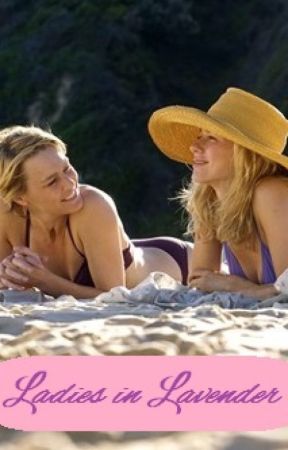A/N - This is part II of the original story 'Ladies in Lavender' by William J. Locke published in 1919.
IV
One afternoon Miss Janet had an inspiration.
"If I played the piano in the drawing-room with the windows open you could hear it in the spare room quite plainly."
"If you think it would disturb Mr. Andrea," said Miss Ursula, "you might shut the windows."
"I was proposing to offer him a distraction, dear," said Miss Widdington. "These foreign gentlemen are generally fond of music."
Miss Ursula could raise no objection, but her heart sank. She could not play the piano.
She took her seat cheerfully, however, by the bed, which had been wheeled up to the window, so that the patient could look out on the glory of sky and sea, took her knitting from a drawer and began to turn the heel of one of the sacred socks. Andrea watched her lazily and contentedly. Perhaps he had never seen two such soft-treaded, soft-fingered ladies in lavender in his life. He often tried to give some expression to his gratitude, and the hand-kissing had become a thrice daily custom. For Miss Widdington he had written the word "Engel," which the vocabulary at the end of Otto's German grammar rendered as "Angel"; whereat she had blushed quite prettily. For Miss Ursula he had drawn, very badly, but still unmistakably, the picture of a winged denizen of Paradise, and she, too, had treasured the compliment; she also treasured the drawing. Now, Miss Ursula held up the knitting, which began distinctly to indicate the shape of a sock, and smiled. Andrea smiled, too, and blew her a kiss with his fingers. He had many graceful foreign gestures. The doctor, who was a plain, bullet-headed Briton, disapproved of Andrea and expressed to Dorcas his opinion that the next things to be washed ashore would be the young man's monkey and organ. This was sheer prejudice, for Andrea's manners were unexceptionable, and his smile, in the eyes of his hostesses, the most attractive thing in the world.
"Heel," said Miss Ursula.
"'Eel," repeated Andrea.
"Wool," said Miss Ursula.
"Vool," said Andrea.
"No—wo-o," said Miss Ursula, puffing out her lips so as to accentuate the "w."
"Wo-o," said Andrea, doing the same. And then they both burst out laughing. They were enjoying themselves mightily.
Then, from the drawing-room below, came the tinkling sound of the old untuned piano which had remained unopened for many years. It was the "Spring Song" of Mendelssohn, played, schoolgirl fashion, with uncertain fingers that now and then struck false notes. The light died away from Andrea's face, and he looked inquiringly, if not wonderingly, at Miss Ursula. She smiled encouragement, pointed first at the floor, and then at him, thereby indicating that the music was for his benefit. For awhile he remained quite patient. At last he clapped his hands on his ears, and, his features distorted with pain, cried out:
"Nein, nein, nein, das lieb' ich nicht! Es ist hässlich!"
In eager pantomime he besought her to stop the entertainment. Miss Ursula went downstairs, hating to hurt her sister's feelings, yet unable to crush a wicked, unregenerate feeling of pleasure.
"I am so sorry, dear Janet," she said, laying her hand on her sister's arm, "but he doesn't like music. It's astonishing, his dislike. It makes him quite violent."
Miss Widdington ceased playing and accompanied her sister upstairs. Andrea, with an expressive shrug of the shoulders, reached out his two hands to the musician and, taking hers, kissed her finger-tips. Miss Widdington consulted Otto.

YOU ARE READING
Ladies in Lavender #VisualRetelling #AU
Historical Fiction***FREE STORY***As World War One rages, in the quiet village of Trevannic, a young stranger washes up on the idyllic Cornish shore. His appearance and origins are a mystery. His Greek god muscular good looks and musical genius charms the little vil...
